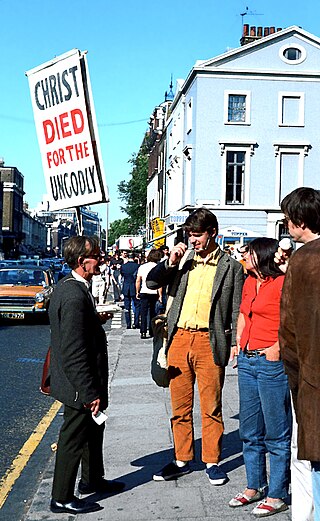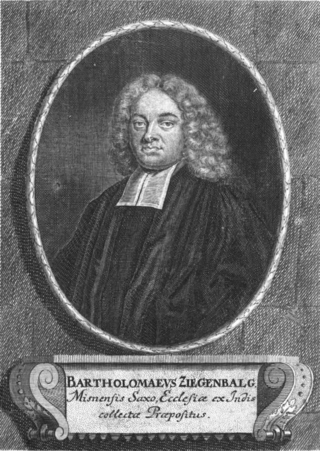Religious conversion is the adoption of a set of beliefs identified with one particular religious denomination to the exclusion of others. Thus "religious conversion" would describe the abandoning of adherence to one denomination and affiliating with another. This might be from one to another denomination within the same religion, for example, from Protestant Christianity to Roman Catholicism or from Sunnī Islam to Shīʿa Islam. In some cases, religious conversion "marks a transformation of religious identity and is symbolized by special rituals".
Universalism is the philosophical and theological concept that some ideas have universal application or applicability.

Comparative religion is the branch of the study of religions with the systematic comparison of the doctrines and practices, themes and impacts of the world's religions. In general the comparative study of religion yields a deeper understanding of the fundamental philosophical concerns of religion such as ethics, metaphysics and the nature and forms of salvation. It also considers and compares the origins and similarities shared between the various religions of the world. Studying such material facilitates a broadened and more sophisticated understanding of human beliefs and practices regarding the sacred, numinous, spiritual and divine.

Proselytism is the policy of attempting to convert people's religious or political beliefs. Carrying out attempts to instill beliefs can be called proselytization.

Apologetics is the religious discipline of defending religious doctrines through systematic argumentation and discourse. Early Christian writers who defended their beliefs against critics and recommended their faith to outsiders were called Christian apologists. In 21st-century usage, apologetics is often identified with debates over religion and theology.

Organized religion, also known as institutional religion, is religion in which belief systems and rituals are systematically arranged and formally established, typically by an official doctrine, a hierarchical or bureaucratic leadership structure, and a codification of proper and improper behavior.

In the field of comparative religion, many scholars, academics, and religious figures have looked at the relationships between Hinduism and other religions.

The Goa Inquisition was an extension of the Portuguese Inquisition in Portuguese India. Its objective was to enforce Catholic orthodoxy and allegiance to the Holy See. Conversions took place through the Goan Inquisition with the persecution of Hindus and the destruction of Hindu temples.
Don Cupitt is an English philosopher of religion and scholar of Christian theology. He has been an Anglican priest and a lecturer in the University of Cambridge, though is better known as a popular writer, broadcaster and commentator. He has been described as a "radical theologian", noted for his ideas about "non-realist" philosophy of religion.

Hinduism is the third largest religious group in the United Kingdom, after Christianity and Islam; the religion is followed by around 1.7% of the total population of the nation. Hindus had a presence in the United Kingdom since the early 19th century, as at the time India was part of the British Empire. Many Indians in the British Indian Army settled in the United Kingdom of Great Britain and Northern Ireland. According to 2021 United Kingdom census, 1,032,775 residents (1.7%) identified themselves as Hindus.

The Sea of Faith Network is an organisation with the stated aim to explore and promote religious faith as a human creation.

The Christian ashram movement is a movement within Christianity in India that embraces Vedanta and the teachings of the East, attempting to combine the Christian faith with the Hindu ashram model and Christian monasticism with the Hindu sannyasa tradition.

Bartholomäus Ziegenbalg was a member of the Lutheran clergy and the first Pietist missionary to India.
Paul David Loup Avis is an English Anglican priest, theologian, and ecumenist. He was General Secretary of the Church of England's Council for Christian Unity from 1998 to 2011, theological consultant to the Anglican Communion Office, London, from 2011 to 2012, and Canon Theologian of Exeter Cathedral from 2008 to 2013. He was honorary professor in the Department of Theology and Religion at Durham University 2017–2021 and is currently Honorary Professor in the School of Divinity, University of Edinburgh (2022-). At the University of Exeter he was visiting professor of theology from 2009 to 2017 and subsequently honorary research fellow until 2021. He is the editor of the series Anglican-Episcopal Theology and History, also published by Brill. Avis was also a chaplain to Queen Elizabeth II, 2008–2017.
Paul David Devanandan (1901–1962), spelt also as P.D. Devanandan or Paul D. Devanandan, was an Indian Protestant theologian, ecumenist, and one of the notable pioneers in inter-religious dialogues in India.
Pandipeddi Chenchiah (1886–1959), spelt also as Pandippedi Chenchiah, a first generation indigenous convert to Christianity, was a jurist, South Indian Christian theologian, and radical thinker of Rethinking Christianity in India group for Indianisation of Christianity. He published Rethinking Christianity in India, as an Indian Christian answer to the Hendrik Kraemer's The Christian Message in a Non-Christian World.

John Nicol Farquhar was a Scottish educational missionary to Calcutta, and an Orientalist. He is one of the pioneers who popularised the Fulfilment theology in India that Christ is the crown of Hinduism, though, Fulfilment thesis in Bengal was built on foundation originally laid in Madras by William Miller.
Religious syncretism is the blending of religious belief systems into a new system, or the incorporation of other beliefs into an existing religious tradition.
Mataparīkṣottara, also called Mataparīkṣottaram, is an 1840 Sanskrit-language text by Harachandra Tarkapanchanan of Calcutta, British India. It is a Hindu apologist response to the Christian writer John Muir's Mataparīkṣā.










